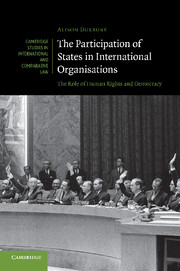Book contents
- Frontmatter
- Contents
- Foreword
- Acknowledgements
- Table of cases
- Table of treaties
- List of abbreviations
- Introduction
- 1 The move to institutions in the age of rights
- 2 The challenge of universality – the League of Nations and the United Nations
- 3 Rights, regionalism and participation in Europe
- 4 Restricting the ranks – excluding states from closed organisations
- 5 The relationship between powers, purposes and participation in specialised organisations
- 6 Legitimacy, democracy and membership
- Conclusion
- Select bibliography
- Index
- CAMBRIDGE STUDIES IN INTERNATIONAL AND COMPARATIVE LAW
- References
4 - Restricting the ranks – excluding states from closed organisations
Published online by Cambridge University Press: 01 March 2011
- Frontmatter
- Contents
- Foreword
- Acknowledgements
- Table of cases
- Table of treaties
- List of abbreviations
- Introduction
- 1 The move to institutions in the age of rights
- 2 The challenge of universality – the League of Nations and the United Nations
- 3 Rights, regionalism and participation in Europe
- 4 Restricting the ranks – excluding states from closed organisations
- 5 The relationship between powers, purposes and participation in specialised organisations
- 6 Legitimacy, democracy and membership
- Conclusion
- Select bibliography
- Index
- CAMBRIDGE STUDIES IN INTERNATIONAL AND COMPARATIVE LAW
- References
Summary
Sovereignty, democracy and exclusion
The post-War European institutions are not the only international organisations engaged in expanding their membership while at the same time restricting the possibility of participation to a limited group of states. This book will now turn to other closed international organisations that have defined their functions in terms of unifying a territorial area or, at the very least, achieving a level of cooperation between like-minded states. The organisations chosen for analysis in this chapter cover a wide range of regions and stages of integration. As was the case with the three European institutions, none of the organisations discussed in this chapter have desired to achieve universal membership. In some cases the organisations have restricted their membership along geographical lines, although at least one has used historical criteria to determine participation. They range from institutions aspiring to replicate the type of regional unification achieved in Europe (the African Union) to associations aiming at a greater degree of consultation and cooperation (the Commonwealth).
Despite this diversity in aims and geography, the organisations examined below have two common features apart from their desire to restrict membership to a defined group of states – first, their strong adherence to sovereignty and, second, their willingness to exclude members from participation. The first factor makes the second commonality all the more surprising.
- Type
- Chapter
- Information
- The Participation of States in International OrganisationsThe Role of Human Rights and Democracy, pp. 165 - 221Publisher: Cambridge University PressPrint publication year: 2011



